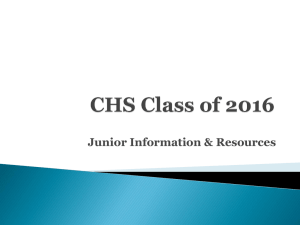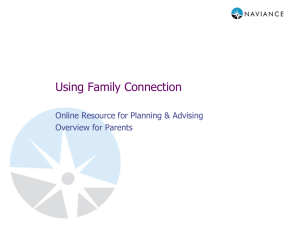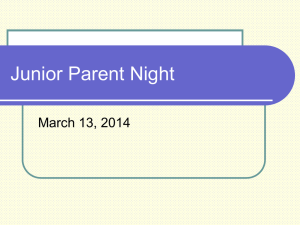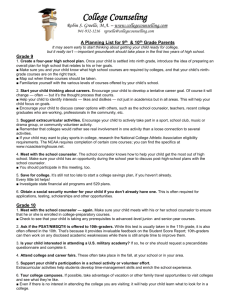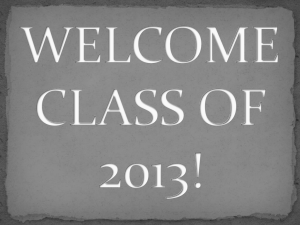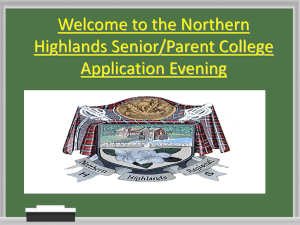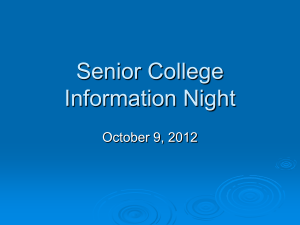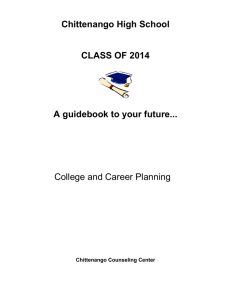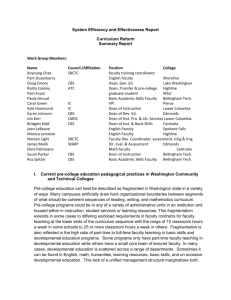COLLEGE & CAREER PLANNING TIMELINE
advertisement
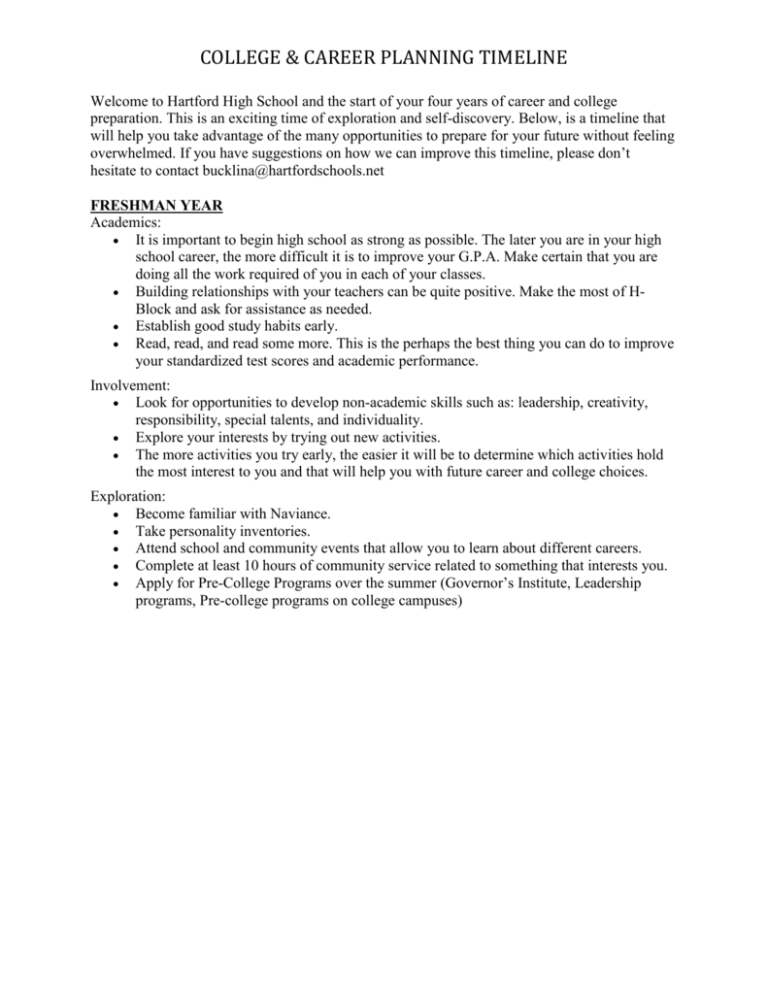
COLLEGE & CAREER PLANNING TIMELINE Welcome to Hartford High School and the start of your four years of career and college preparation. This is an exciting time of exploration and self-discovery. Below, is a timeline that will help you take advantage of the many opportunities to prepare for your future without feeling overwhelmed. If you have suggestions on how we can improve this timeline, please don’t hesitate to contact bucklina@hartfordschools.net FRESHMAN YEAR Academics: It is important to begin high school as strong as possible. The later you are in your high school career, the more difficult it is to improve your G.P.A. Make certain that you are doing all the work required of you in each of your classes. Building relationships with your teachers can be quite positive. Make the most of HBlock and ask for assistance as needed. Establish good study habits early. Read, read, and read some more. This is the perhaps the best thing you can do to improve your standardized test scores and academic performance. Involvement: Look for opportunities to develop non-academic skills such as: leadership, creativity, responsibility, special talents, and individuality. Explore your interests by trying out new activities. The more activities you try early, the easier it will be to determine which activities hold the most interest to you and that will help you with future career and college choices. Exploration: Become familiar with Naviance. Take personality inventories. Attend school and community events that allow you to learn about different careers. Complete at least 10 hours of community service related to something that interests you. Apply for Pre-College Programs over the summer (Governor’s Institute, Leadership programs, Pre-college programs on college campuses) COLLEGE & CAREER PLANNING TIMELINE SOPHOMORE YEAR Academics: If appropriate, challenge yourself with advanced or AP classes. Take the PSAT for the first time and review your results. Make sure to use the practice tests and tutorials over the spring and summer before Junior year to improve as needed. Register for the June SAT Subject Tests if appropriate. See your school counselor for more details. Read, read, and read some more. This is the perhaps the best thing you can do to improve your standardized test scores and academic performance. Attend your sophomore conference with your school counselor Exploration: Take Career Interest inventories in Naviance Visit the HACTC programs and complete an application if you decide to attend. Research schools through Naviance or BigFuture Attend College Planning Night and other Guidance programs throughout the year. Complete at least 10 hours of community service related to something that interests you. Begin to include college campus visits as part of your family vacations or long weekends and breaks. Apply for Pre-College Programs over the summer (Governor’s Institute, Leadership programs, Pre-college programs on college campuses) Involvement: Continue to pursue opportunities to develop non-academic skills such as: leadership, creativity, responsibility, special talents, and individuality. Try out new activities and get even more involved in ones that you love. COLLEGE & CAREER PLANNING TIMELINE JUNIOR YEAR Month by month September Prepare for the PSAT. o The October test will be used to determine the National Merit Semifinalists and Commended students. Visit with college admissions officers who offer info sessions in Guidance. Work on maintaining or improving your grades. Your cumulative GPA through Junior year as well as your grades from the first semester of senior year are the ones colleges will consider when reviewing your application. October Visit with college admissions officers who offer info sessions in Guidance. Take the PSAT/NMSQT at HHS. December Results of the PSAT are returned to students. o Review your scores to help identify the areas you need to concentrate on in your preparation for the SAT. o Begin preparation for the SAT and ACT. Use our online software (PLATO) and the online practice tests through College Board January - February Take the SATs Plan college visits for February and/or April vacation Visit colleges during long weekends and school vacations March Take the SATs (if you did not do so in January) Attend your Junior Meeting with your school counselor to begin the college selection process. Attend the College Planning Night April Visit colleges over April break Take the ACTs Register for May SAT Subject Tests May - June Take the ACT or SAT if you have not already done so (or a second time if you are ready) Attend a college fair Apply for Pre-College Programs over the summer (Governor’s Institute, Leadership programs, Pre-college programs on college campuses) Register for the June SAT Subject Tests, if appropriate. COLLEGE & CAREER PLANNING TIMELINE JUNIOR YEAR (cont) Take the May or June SAT Subject Tests Identify two current teachers (one English or Social Studies and one Math or Science) to write letters of recommendation and consider asking them before the summer. Choose your senior classes. Make sure to focus on rigorous classes that will help you prepare for college. Admissions officers do not like to see a lot of ‘fluff’ classes in your senior year. Consider including at least one of the following course options for senior year: o Dartmouth and/or CCV courses o Independent study (work with a teacher here to create and pursue a course that interests you that we don’t currently offer) o Internships Division I or II athletic recruits. o Register with the NCAA Clearinghouse. This is required to make an “official” visit as a prospective student-athlete or to play at the Division I or II level. Register online at www.eligibilitycenter.org. Pre-Senior Summer July-August Read, read, and read some more. This is the perhaps the best thing you can do to improve your standardized test scores and academic performance. Visit college websites and look through college guidebooks. o o The Fiske Guide to Colleges, Princeton Review’s Best 378, Peterson’s Competitive Colleges, The Insiders Guide to the Colleges, and Colleges That Change Lives o Make college campus visits. o Read carefully the brochures you receive in the mail or in the admissions office. o Begin thinking about and creating a draft of your college essay. Use the Common Application topics as a guide. Attend Pre-College Programs over the summer (Governor’s Institute, Leadership programs, Pre-college programs on college campuses) COLLEGE & CAREER PLANNING TIMELINE SENIOR YEAR August Create your Common Application account. www.commonapp.org. The application should be available on August 1st. September-October Begin working on your applications. Link your Naviance account with your Common Application account. Schedule meetings with your school counselor. Know what your deadlines are and plan so you can meet them. o Be sure you research each school’s financial aid and scholarship process and deadlines. Some schools require a CSS Profile to be considered for financial aid. If you are applying early, this may be due as early as October. Save all of your documents (essays and short answers) so you can use them for other applications. Have your school counselor and another trusted teacher read your essay. Request at least two letters of recommendation if you have not already done so (It’s good to have one in a math or science class and one in a Social Studies or English class). Early Decision and Early Action applications must be completed now. (Deadlines do vary, but many are November 1 or November 15. The University of California system application process is geared around the month of October.) Keep your grades up. The first quarter of senior year is a critical marking period. Some colleges will wait to make a decision until after they see first quarter grades. Register to retake the SAT, ACT, or SAT Subject Tests. Over two-thirds of students improve the second time around. o HHS is a test center for the ACT in October and April and the SAT/SAT Subject Tests in October, March and June. o Update/Complete your resume in Naviance. This will be useful for the “activities” section of most applications as well as helping you organize your thoughts for college admission or alumni interviews. o Meet with the college reps from any school in which you are interested when they come to HHS. o Finish campus visits to your top schools. Arrange for permission for these trips with the Guidance Office. November Finish and submit your applications. o The earlier you have them completed the better. o Have your school counselor review your application before you submit. o Make sure you put your full effort into your application. December Complete any applications you still intend to submit. Apply for your FAFSA PIN # at www.pin.ed.gov (if you are planning to apply for needbased financial aid). COLLEGE & CAREER PLANNING TIMELINE SENIOR YEAR – (cont) January Submit any last applications. Check with your school counselor to make sure your first semester grades are sent to all of your schools. Complete your FAFSA online at www.fafsa.ed.gov. You may also need to complete the CSS/Profile (if you are planning to apply for need-based financial aid). o You can file the FAFSA and CSS/Profile before you file your tax forms with the IRS. It is possible to use estimated data, although actual data are better. o Some colleges may contact you for an alumni interview. Pick up your VSAC booklet and identify scholarship that apply to you (including the Gilman) February-March Check your email and respond quickly to any requests for additional information from college admissions and financial aid offices. Be patient and wait. Admissions offices are very busy and they are doing their best to give your application every possible consideration. This can be a stressful time, so make sure you talk things through…with your friends, your parents, your advisor, your school counselor or your teachers. Submit your VSAC scholarship application and VSAC Grant application at vsac.org April Finish strong in your classes: your college will see your final grades. All offers of admission are contingent upon you successfully completing your final semester. This means performing at the same level you did throughout high school. Continue searching and applying for scholarships. Check the Guidance office scholarship board. Review all your acceptances and financial aid awards. Meet with your school counselor to discuss your college options. If you have any doubts about your decision, visit the colleges you have been accepted to: stay overnight, sit in on a class, talk to students and professors, and get a feel for campus. By May 1, notify all colleges who accepted you that you will or will not be enrolling. Your enrollment deposit must by paid by May 1 to the college you plan to attend. You may only deposit at one school. May May 1 is the deposit deadline for most colleges. Inform the Guidance Office of your college choice so your final official transcript is sent to the correct school. Now enjoy prom and all of the end-of-senior-year activities…you deserve it!!
